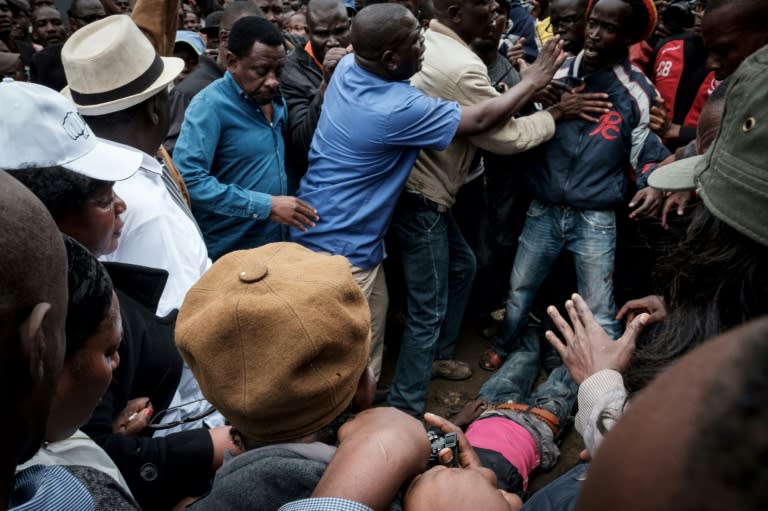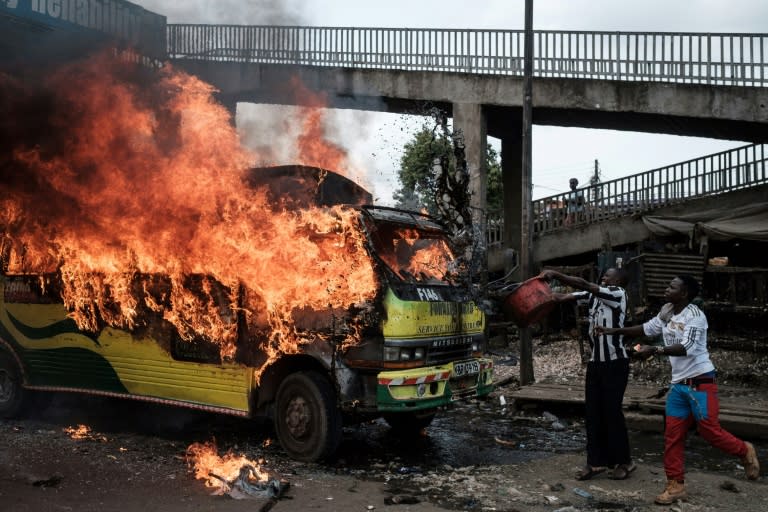Clashes as 4 bodies found in Nairobi slum
Clashes erupted in a Nairobi slum Sunday after four bodies were found in the streets, hiking tensions on the eve of a Supreme Court ruling on the validity of last month's divisive election re-run. The bodies of three men and a woman were found in the city's Mathare slum, one of several flashpoint areas where violence erupted during the disputed October 26 vote which was largely boycotted by the opposition. The discovery came just two days after three people were shot dead in a nearby suburb during clashes with police which erupted as thousands of opposition supporters turned out for their leader, Raila Odinga. Nairobi police chief Japheth Koome said the cause of the four deaths was not immediately clear but that the victims appeared to have been hit by a blunt object, while one had also been cut. However, the opposition claimed the group had been shot dead. "Investigations are going on into the killings of the four people in Mathare Area 1," Koome said. "The people were found dead and we want to establish how they were killed," he said. When the bodies were found, angry residents clashed with police, setting fire to two buses and another vehicle. In a bid to head off any further unrest, police immediately brought in reinforcements and several water cannon, AFP correspondents at the scene said. The outrage spread to Kibera, another slum in Nairobi, where people also protested in anger at events in Mathare. “What is happening is completely wrong," said Odinga, head of the National Super Alliance (NASA) coalition, during a visit to the slum Sunday. "This is state sponsored violence to intimidate NASA supporters. "The church and the international community should intervene before the situation gets worse. They are killing innocent people." - Ethnically motivated? - Speaking on condition of anonymity, a police official told AFP that angry residents believed the murders were ethnically motivated, blaming the violence on the Mungiki, a feared criminal gang known for running protection rackets and violently defending tribal business interests. Drawing its members from Kenya's largest tribe -- the Kikuyu, to which President Uhuru Kenyatta belongs -- the Mungiki were responsible for much of the deadly ethnic violence which swept the country in the months after the 2007 election. Today, the term is widely used in reference to groups of armed Kikuyu men. But the police chief was quick to rule out any ethnic factors in Mathare, where many Kikuyu live alongside ethnic Luo or Luhya, who largely back Odinga. "It is not about ethnic clashes," Koome said, insisting that it was a criminal matter, but without giving details. Since Friday, Kenya has been on edge following a mass opposition demonstration to welcome Odinga back from a trip overseas turned violent, with three demonstrators shot dead in Muthurwa, a suburb not far from Mathare. Angry protesters hurled stones at police who hit back with tear gas and water cannon in running street battles which lasted all day. The violence soured a gathering to mark Odinga's return from a 10-day trip to the United States where he was trying to rally support for the holding of new elections. - Key ruling looms - Tensions are also high ahead of a key Supreme Court ruling on Monday over whether Kenyatta can be sworn in for a second term or if there must be another presidential re-run. Although Kenyatta won the October 26 vote with 98 percent of the votes cast, the ballot was boycotted by Odinga and his supporters who clashed violently with police in his strongholds in the west and in several Nairobi slums. It was also marred by low turnout. The vote was the chaotic climax of two months of political drama sparked by an earlier Supreme Court ruling on September 1 which overturned Kenyatta's victory in an initial August election over widespread irregularities and mismanagement by the IEBC electoral commission. If the judges validate Kenyatta's win, he will be invested on November 28. Otherwise a third election will have to be organised within 60 days.




